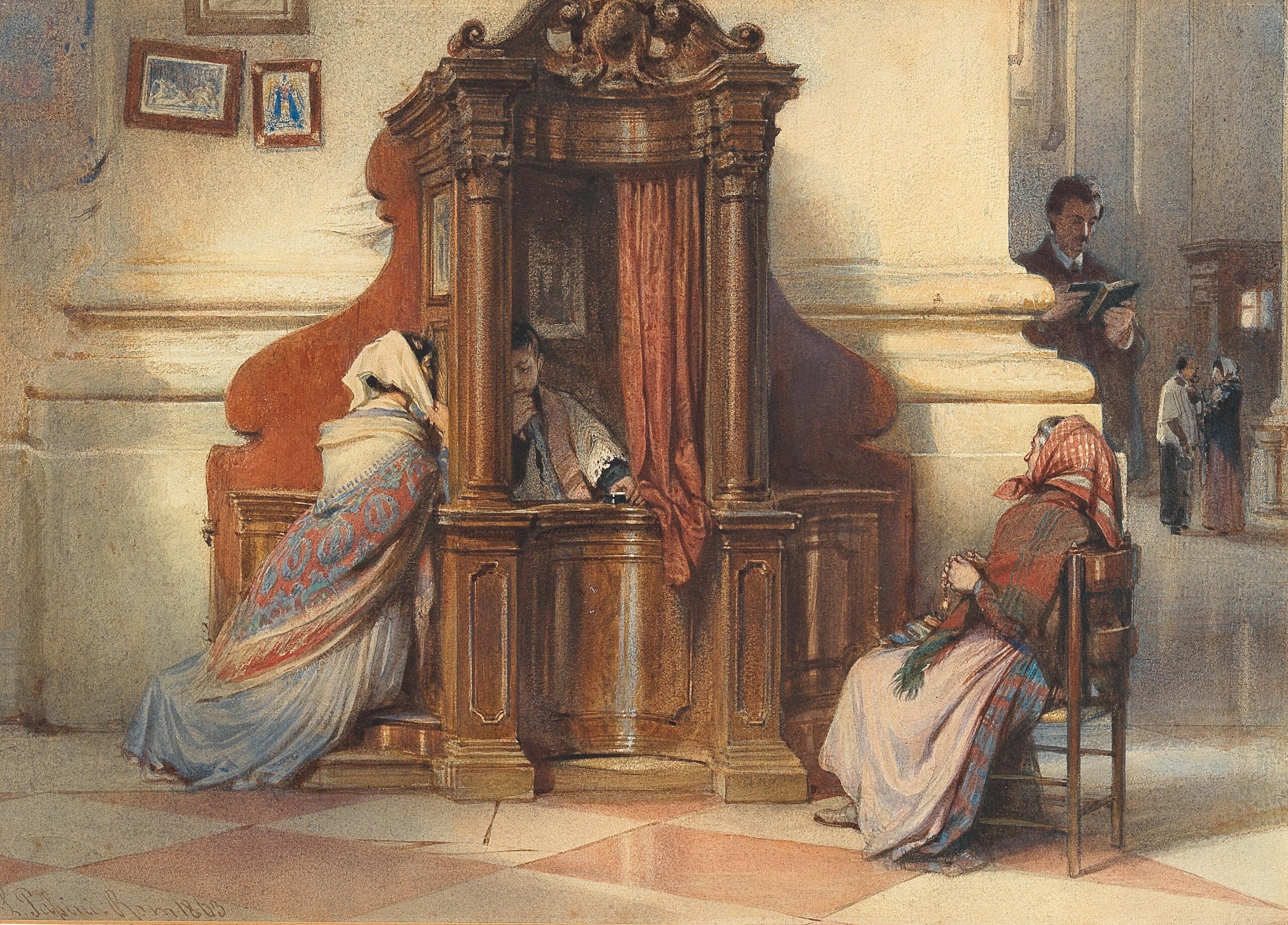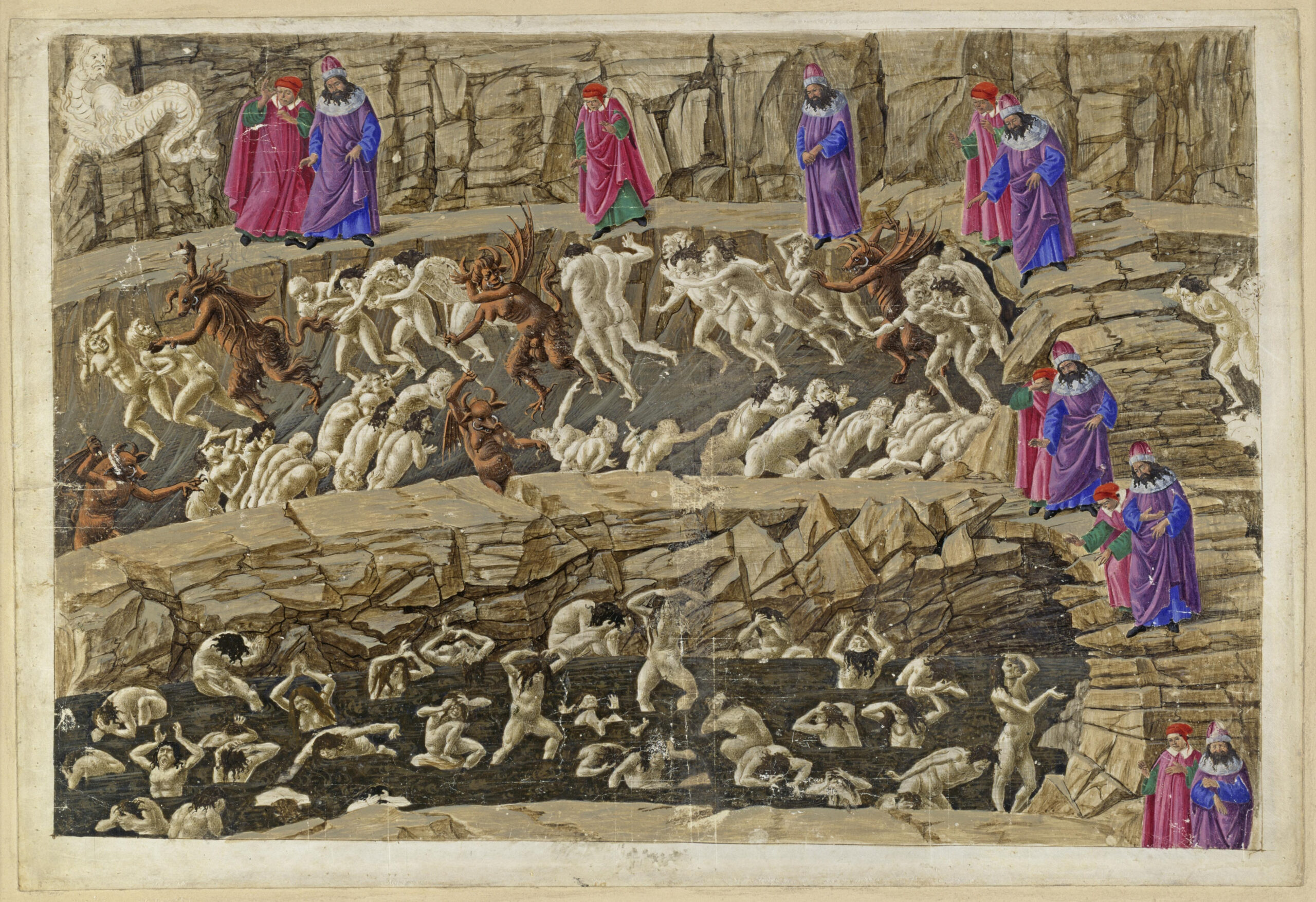In this spiritual masterpiece, Saint Pope Leo IX identifies our foes—vices and temptations—and teaches us how to combat them with virtue. Read on to learn how to defeat vainglory and false piety.
Counterfeit Piety then walks in. He has his hands clasped in apparently devout prayer, and has multiple sets of rosary beads hanging from his belt which jangle noisily. Despite his evident attempts to maintain a pious demeanor, his eyes constantly move about shiftily, as if he is keen to see whether or not anyone is looking at him.
He speaks thus to the soul:
My friend, you know that you have no genuine good inclinations within you and that if people saw you as you really are, they would inevitably condemn you for not meeting their standards and expectations. For everyone is ready to judge you the moment they have the chance! So, here’s what you should do: study carefully what other people expect and admire, and then deliberately cultivate for yourself a false exterior which meets these expectations.
If necessary, project to the world an image of someone who is quite different from the innermost desires of your heart. Never let your real self and your true feelings and nature be seen by anyone! In this way, all will come to call you good and holy and treat you with reverence and respect.
But True Holiness appears. She looks just like any regular person, and you would not spot her for who she is immediately. Yet an aura of kindness, honesty, and reverence emanates from her. She answers the temptation of Counterfeit Piety—who, in fact, is a distant cousin of hers—with the following words:
My friend, don’t listen to this wicked and foolish advice of my misguided kinsman, Counterfeit Piety! If you recognize your own sinfulness and wicked tendencies, that is indeed a fine and beneficial thing. But if this is the case, do not just try to appear to be something else than what you are, but instead try to become something else! Why be content with seeming to be good when you could be good in reality? Can a false appearance ever be preferable to the real thing?
Don’t forget those words frighteningly spoken by Our Lord Jesus when He said, “Woe to you, scribes and Pharisees! Hypocrites! You are like cups which are clean and polished on the outside, but inside are filled with filth.” And a little later, He continued, “You are like whitewashed tombs, which seem beautiful on the outside, but inside are filled with the bones of the dead and with all kinds of foulness.” And did He not condemn those who are wolves on the inside but conceal their true natures beneath the clothing of sheep? And what are any external pretensions to goodness apart from such deceptive garments of disguise?
My friend, since you already aspire to be regarded as holy, it must be plain to you already that holiness is an intrinsically good and desirable thing. So why settle for false holiness when you could very readily cultivate true holiness? Why be content with appearances when the reality is so generously offered to you?
To seek to appear to be something which you are not is both wearying and fruitless. But to seek to become truly holy and good is to become the person who God created you to be! Do this, and you shall find perfect happiness.
Next, Vainglory appears and approaches the soul. This vice is clad in a brilliant white robe and wearing rings on his fingers, displaying what appear to be precious gems. But a closer inspection reveals that the apparently brilliant robe is, in fact, made of filthy and stained cloth, and merely clumsily painted over with white, and the jewels, which looked like precious gems, are pieces of counterfeit. Vainglory holds a mirror in one hand, is constantly anxiously checking and adjusting his appearance.
This vice says to the soul:
Achieve whatever praiseworthy things are possible for you, and do all the good and notable things you can! Then make sure that you show these good deeds to other people so that you will be described as good and declared to be holy by all, and recognized as one of those specially chosen by God. That way, no one will ever dare to look down upon you or despise you. Rather, everyone will show you the respect you truly deserve! Let them see your good works, and they will give praise to God! And, more importantly, they will also give praise to you.
Meanwhile, Fear of the Lord has been sitting nearby, reading from a small volume of Sacred Scripture. Upon hearing the voice of Vainglory, he stands up to his full height. He is dressed in black and has an intelligent and serious expression on his face. Fear of the Lord then says to the soul:
This is foolish and fatuous advice, so typical of the voice of Vainglory! My friend, if you do any good works, don’t do them for the sake of rewards which are only transitory and illusory but rather for those honors which will last forever. Don’t make a display of your merits, but keep them hidden away from human view as much as you are able. And if you are not able to do this always (as is almost inevitably the case), at least try to do so and sincerely desire to do so. Above all, shun the arrogance of parading your supposed merits before others! For such arrogance almost always comes before a fall.
Of course, though, you are not guilty of any sin if other people do sometimes recognize your good works and praise you for it—as long as gaining this praise was never your principal motivation. Hence it is that we find that our Redeemer spoke two sentences, which are apparently in contradiction, but not so in reality. For at one point, Christ said, “When you give alms, let your left hand not know what your right hand is doing. But let your almsgiving be in secret, so that your Father who sees all that is done in secret shall reward you.” But a little earlier, He had exhorted us, “Let them see your good works, so that they may glorify your Father who is in heaven.”
The key is to be constantly cautious, lest what Our Lord declared concerning the hypocrites may ever be applied to you as well. For He said of such hypocrites, “They do all their good works just so that they will be praised by others.” And, reproving such people, He asserted, “I tell you solemnly, they have already received their rewards!”
O Soul, examine yourself and your true motives very carefully in all the things which you do! Take care that you never become infected with the hidden taint of pride, or that vainglory does not become your secret and ulterior motive. Otherwise, you might end up like those who glory in empty signs and displays, but come, on the Day of Judgment, to hear the dreaded words of everlasting damnation: “Behold, I saw the morning star fall from the sky like lightning!”
ooo
This article is taken from a chapter in The Battle of the Virtues and Vices by Saint Pope Leo IX which is available from TAN Books.









